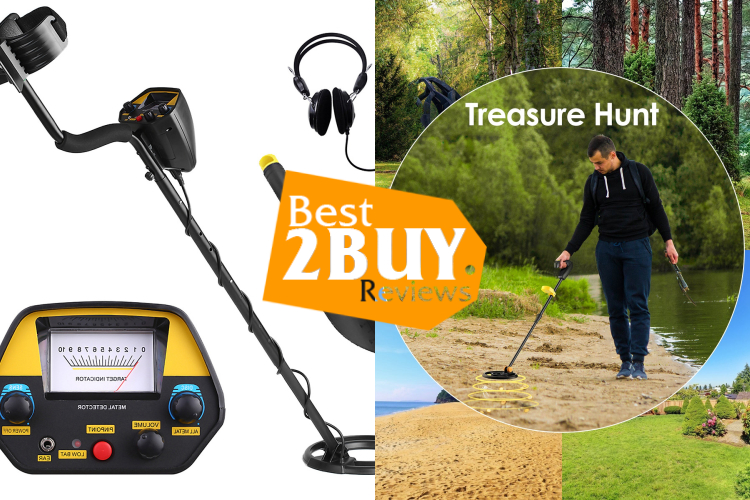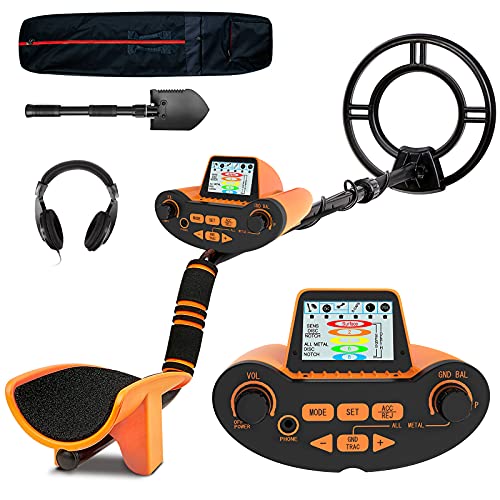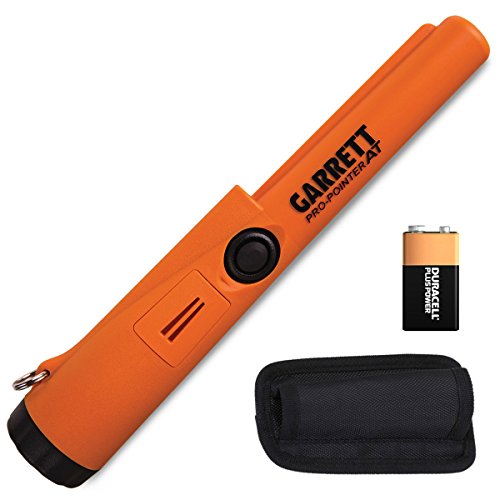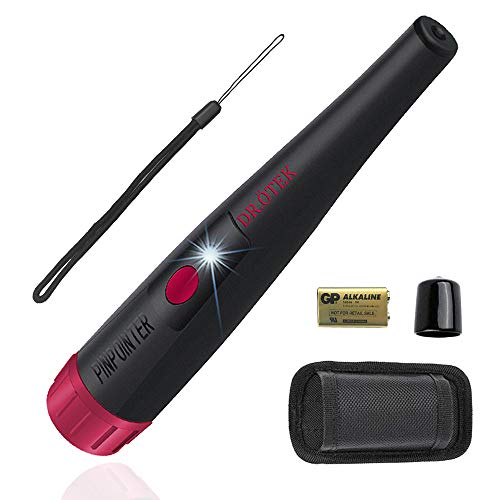How to Choose the Metal Detectors
A Comprehensive Guide To Metal Detectors

- 1. A Comprehensive Guide To Metal Detectors
- 1.1. What Is A Metal Detector?
- 1.2. History of Metal Detectors
- 1.3. Metal Detectors Technology
- 1.4. Applications of Metal Detectors
- 1.4.1. Security Screening
- 1.4.2. Archaeology
- 1.4.3. Treasure Hunting
- 1.4.4. Construction Industry
- 1.5. Choosing the Right Metal Detector
- 1.5.1. Types of Metal Detectors
- 1.5.2. The Key Factors To Consider
- 1.5.2.1. Purpose of Use
- 1.5.2.2. Types of Metal Detectors
- 1.5.2.3. Frequency of Use and Durability
- 1.5.2.4. Target Type and Size
- 1.5.2.5. Depth and Sensitivity
- 1.5.2.6. Discrimination and Target ID Features
- 1.5.2.7. Budget Considerations
- 1.5.2.8. Weight and Ergonomics
- 1.6. Conclusion
Metal detectors have undergone significant advancements since their initial use as basic tools in military and industrial settings. Presently, they have transformed into intricate devices crucial for security measures, while also gaining popularity among hobbyists, treasure seekers, and archaeologists. This piece delves into the captivating realm of metal detectors, delving into their historical evolution, technological intricacies, diverse applications, and the excitement associated with uncovering concealed treasures.
What Is A Metal Detector?
A metal detector is an apparatus designed to identify the existence of metal items by utilizing electromagnetic fields. It generally comprises a portable unit equipped with a sensor coil, which is moved across the ground or various surfaces. The fundamental concept underlying a metal detector is that when it approaches a metal object, the electromagnetic field it generates interacts with the metal, resulting in the generation of an electric current. This electric current, in turn, produces a secondary magnetic field that the detector is capable of sensing.
History of Metal Detectors
Metal detectors trace their roots back to the late 19th century when scientists began conducting experiments with electromagnetism. Alexander Graham Bell created an early version of the metal detector in 1881 while attempting to locate the bullet lodged in President James Garfield's body after an assassination attempt. However, it wasn't until the 1920s that the first functional metal detector, credited to Dr. Gerhard Fischer, a German physicist, was developed.
Metal Detectors Technology
Metal detectors in contemporary times function by leveraging the principles of electromagnetism and magnetic induction. Upon encountering the electromagnetic field produced by the detector, a metal object induces a secondary magnetic field within itself. The disruption resulting from this interaction is subsequently detected by the coil of the metal detector, prompting the generation of an audio or visual signal to notify the user of the metal's presence.
Various types of metal detectors exist, each tailored for specific applications. Very low frequency (VLF) detectors are commonly used for general purposes. In contrast, pulse induction (PI) detectors excel at detecting objects in highly mineralized soil, making them ideal for activities like treasure hunting and gold prospecting.
Applications of Metal Detectors
Security Screening
Metal detectors are essential components in the security screening process at airports, public gatherings, and government facilities. Their primary function is to deter the introduction of weapons and other metallic items that may jeopardize public safety.
Archaeology
Metal detectors are employed by archaeologists to discover artifacts buried beneath the Earth's surface. These instruments allow researchers to investigate historical sites without the need for extensive excavation, thereby maintaining the integrity of the archaeological site.
Treasure Hunting
Treasure hunting stands out as one of the foremost uses of metal detectors. Devotees employ these devices to seek out coins, jewelry, and other precious items concealed beneath the earth's surface. The thrill of revealing hidden treasures infuses an exhilarating dimension into this pastime.
Construction Industry
In the construction industry, metal detectors are used to locate buried utilities and infrastructure before excavation. This helps prevent damage to existing pipes and cables and ensures a safe and efficient construction process.
Choosing the Right Metal Detector
With the diverse range of metal detectors on the market, choosing the most appropriate one can be a challenging endeavor. Let's examine key factors to keep in mind when selecting a metal detector that fits your preferences.
Types of Metal Detectors
- Metal Detectors for Beginners: Ideal for those new to the hobby, these metal detectors offer simplicity and basic features, making them well-suited for use in parks, fields, and open areas. They are user-friendly and perfect for novice enthusiasts.
- Professional-Grade Metal Detectors: Tailored for experienced users seeking top-tier performance and sensitivity, these metal detectors boast advanced features like intelligent discrimination settings, a variety of frequency options, and enhanced target-finding capabilities. Designed to excel in challenging conditions, such as heavily mineralized soils or areas with abundant debris.
- Underwater Metal Detectors: Specifically crafted for underwater use in environments like oceans, lakes, and rivers, these detectors come in various types, including pulse induction and very low frequency (VLF) models. When selecting an underwater metal detector, it's crucial to consider factors such as water depth, whether it will be used in saltwater or freshwater, and the specific types of targets you intend to locate.
The Key Factors To Consider
Purpose of Use
The first step in selecting a metal detector is defining your purpose. Different detectors are designed for various applications, such as coin shooting, relic hunting, gold prospecting, or underwater treasure hunting. Knowing your primary use will help narrow down the options and ensure you choose a detector with the right features and capabilities.
Types of Metal Detectors
There are three main types of metal detectors:
- VLF (Very Low Frequency): Ideal for general-purpose detecting, they are versatile and work well in a variety of environments.
- PI (Pulse Induction): Suited for specialized purposes like gold prospecting and beach hunting, as they excel in areas with high mineralization.
- Multi-Frequency: Combines VLF and PI technologies, providing versatility for different conditions.
Understanding the strengths and weaknesses of each type will help you make an informed decision based on your specific needs.
Frequency of Use and Durability
Consider how often you plan to use the metal detector and the environments you'll explore. If you're a frequent user, investing in a durable and well-built detector is essential. Look for models with sturdy construction and resistance to the elements, especially if you intend to use it in challenging conditions like saltwater beaches or rocky terrains.
Target Type and Size
Different metal detectors excel at detecting specific types and sizes of targets. If you're primarily interested in coins and jewelry, a detector with a smaller coil and higher frequency may be more suitable. For larger objects or deeper targets, a larger coil and lower frequency may be more effective. Understanding the types of targets you're likely to encounter will guide you in selecting the appropriate detector.
Depth and Sensitivity
The depth at which a metal detector can detect objects is a critical factor. Generally, detectors with lower frequencies penetrate deeper, making them suitable for relic hunting or prospecting. Sensitivity, on the other hand, determines a detector's ability to pick up smaller or faint signals. Striking the right balance between depth and sensitivity is crucial for optimizing your metal detecting experience.
Discrimination and Target ID Features
Discrimination allows you to filter out unwanted items, such as nails or bottle caps, while Target ID features provide information about the type of metal detected. Advanced discrimination and Target ID capabilities enhance your efficiency and reduce frustration by minimizing false signals and helping you prioritize valuable finds.
Budget Considerations
Metal detectors come in a wide range of prices, and your budget will play a significant role in determining the options available to you. While it's tempting to opt for the most advanced model, consider your level of expertise and commitment to the hobby. There are excellent detectors available at various price points, so choose one that aligns with your budget and meets your specific requirements.
Weight and Ergonomics
The weight and ergonomics of a metal detector can impact your comfort during prolonged use. Consider the physical demands of your chosen detecting environment and select a detector that balances weight with durability and functionality. Many detectors also come with adjustable shaft lengths and ergonomic designs to accommodate users of different heights and preferences.
Conclusion
Metal detectors have become essential instruments across diverse domains, playing a crucial role in guaranteeing public safety, as well as revealing historical artifacts and concealed treasures. The ongoing technological advancements have enhanced their accessibility for both enthusiasts and experts. As we progress further, the realm of metal detectors offers the potential for even more thrilling discoveries and opportunities to delve into the enigmatic depths beneath the surface.











